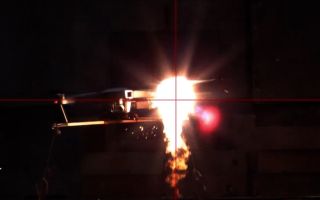
Joint Expeditionary Force is a British defence success, but UK credibility is under threat

Ed Arnold, Senior Research Fellow for European Security at the Royal United Services Institute (RUSI), says the UK needs to make a decision on what to do with the JEF before confidence in the force is lost.
The Joint Expeditionary Force (JEF) is a UK-led, 10-member defence framework focused on northern Europe.
In September 2014, at the Nato Wales Summit, the JEF signed its founding Letter of Intent.
Then-UK Chief of the Defence Staff Lord Richards described the JEF as "the core of the UK's contribution to any military action, whether Nato, coalition or independent".
What has the JEF achieved?
In its first decade, the JEF has developed into a formidable military force within Europe, which was its founding intent.
First, it is led by the UK, which is the only European power to assign its nuclear forces to the defence of Nato, thereby extending its nuclear deterrent to JEF member countries.
If the US security commitment to Europe becomes less reliable, this capability will increase in importance and will be especially valuable to JEF members – five of which border Russia – who could become increasingly exposed due to changes in US policy under Trump, and Kremlin attempts to use sub-threshold means to isolate vulnerable Nato members.
Second, the JEF members have collectively delivered an average real-terms increase in defence spending of 150% since 2014, compared to 108% for the rest of European Nato members.
On the JEF's 10th anniversary this year, all members met or exceeded both the Nato defence investment pledge of 2% of GDP and the guideline of 20% on equipment expenditure as a share of defence expenditure.
Third, JEF members operate some of the most sophisticated military capabilities in Europe – for example, five JEF members operate F-35s out of a total of 11 European air forces.
How has it responded to Russian aggression?
The JEF was quick to respond to Russia's war on Ukraine.
It immediately developed a political dimension and held a leaders call the day after Russian troops invaded.
This was followed by two national Leaders Summits in 2022 which have now become a regular feature.
These summits have strongly advocated for the defence of Ukraine, pushed for a stronger unified position against Russia, and pressured other Nato members to step up.
Indeed, support for Ukraine has become a major political output of the JEF. The 10 JEF members have committed $11.1bn more aid to Ukraine than the 18 remaining European Nato members (Albania and North Macedonia are not included in the dataset).
When Ukraine's assistance is measured as a percentage of GDP, the top 10 countries include eight JEF members.
Operationally, the JEF has chosen to specialise in the protection of Critical National Infrastructure, especially Critical Underwater Infrastructure.
However, on 17 November 2024 – while the JEF was on Exercise Joint Protector 24 in Latvia – two undersea internet cables (one between Finland and Germany and one between Sweden and Lithuania) were damaged.
The Yi Peng 3, a Chinese-flagged vessel, is suspected of dragging its anchor to damage the cable, which echoes the Newnew Polar Bear's (a Hong Kong-flagged vessel) actions during the 2023 Baltic Connector incident.
At the time of writing, the Yi Peng 3 was anchored in international waters between Denmark and Sweden, refusing requests by the latter to move into Swedish waters to support investigators.
Thus far, there has been no public statement from the JEF, and no Joint Response Option has been activated (as they were after the Baltic Connector incident).
The lack of UK engagement is particularly surprising.
What is the future of the JEF?
At the 2023 Visby Leaders' Summit in Sweden, the JEF agreed on a 10-year vision to be a key framework within the future European security architecture.
However, its second decade will be far more challenging than the first.
In a more dangerous and volatile world where the US security commitment to Europe is uncertain and US priorities continue to shift to the rise of China, more will be demanded of the UK as a leading Nato member and the JEF to contribute to European security.
The Leaders Summit in Tallinn on 16 December 2024 is a make-or-break moment for the JEF. While it can celebrate successes over its first decade, it is yet to be seriously tested.
There is a risk that without increased leadership, attention and resources the JEF will be unable to deliver on its self-imposed mandate, causing it to atrophy, which would amount to a serious loss of credibility for UK defence and security leadership in Europe.
Timeframes are not on the JEF's side. It has been 186 days since the Labour Party highlighted further developing the JEF in its manifesto and the Leaders meeting in Tallinn.
No progress has been made on enhancing the JEF and thus momentum has stalled.
With the next Leaders meeting due in Oslo in May 2025, the UK has only six months to save the JEF.
However, the Strategic Defence Review (SDR) is not due to report until March 2025, with the Government's response – alongside the comprehensive spending review – sometime in June or July 2025.
If the UK Government waits for the SDR to tell it what to do with the JEF it will be too late.
By then, confidence in the JEF will be lost, and with it trust in UK defence and security leadership in Europe.
You can listen to Sitrep wherever you get your podcasts, including on the BFBS Forces News YouTube channel.









